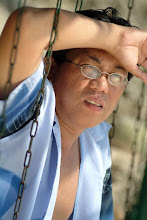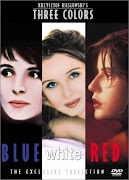 EXACTLY a decade ago, in the morning of the 3rd Iligan National Writers Workshop and Literature Teachers Conference, I sat slack-jawed and starry-eyed while all ears to the keynote lecture of the poet Ricardo de Ungria. It was like listening to a voice from the clouds spelling out the Ten Commandments. You see, when I started to dare find my own spot under the sun of poetry, I was reading—as if it were Holy Scriptures— de Ungria’s collection titled Decimal Places.
EXACTLY a decade ago, in the morning of the 3rd Iligan National Writers Workshop and Literature Teachers Conference, I sat slack-jawed and starry-eyed while all ears to the keynote lecture of the poet Ricardo de Ungria. It was like listening to a voice from the clouds spelling out the Ten Commandments. You see, when I started to dare find my own spot under the sun of poetry, I was reading—as if it were Holy Scriptures— de Ungria’s collection titled Decimal Places.I already had the privilege to personally meet and hear de Ungria the summer before that when I got lucky enough to get a fellowship grant to the three-week national workshop in Dumaguete where—like here in Iligan— I did not care so much if my poems were deemed good or bad. What mattered to me then was to get acquainted with my literary “idols” and fellow neophytes primed for a life-long vocation with words. Of course, it didn’t hurt that my greenhorn attempts at poetry also afforded me an opportunity for free travel, meals and lodging.
For a while there, I slurped at de Ungria’s declarations that “the business of making words seems to be a heavenly venture whose pleasures, brief as they are, weigh equal to its burdens.” Now my head still swims with the dazzling torrent of insight about “sense and silence that wait at the end of words… these “pool of sounds deep in the soul that makes silence tolerable and dangerously seductive.”
First Words, that’s the title of de Ungria’s speech. And mine, this
 morning, are certainly not the last words.
morning, are certainly not the last words.Because, whether I like it or not, what I have to say are merely continuations, a current of ongoing revelations that I’m still wading through, as drenched with wonder as when I stood witness to the flow and plunge of water from the legendary Maria Cristina Falls.
Nothing earth-shaking, my words. I can only swear of feeling what it was like to be struck by a meteor, my knees quaking as they do now, when Madame Christine Godinez-Ortiga asked me to return to this workshop and risk myself being proven undeserving to stand and speak under the long shadow of de Ungria and the succeeding keynote speakers— among them the pillars of Philippine literature who are also this workshop’s panelists.
Immodest not only the honor bestowed upon me by the organizers of this workshop but also my sneaking suspicion that I’m out of place in the company of Christine Godinez-Ortiga, Rosario Cruz-Lucero, Steve Patrick Fernandez, Victor Sugbo, Jaime An Lim, Merlie Alunan (who has spurred me on in my struggle to be unflinching in the demands of the creative life even as she has entrusted and fostered in me the nerve to help in her valiant task in Tacloban to sustain and raise the quality of creative writing in the Visayas--- particularly in the vernacular— through her program called VisWrite) and of course Linda Kintanar-Alburo (who first inspired me to amplify the sound of my mother tongue in Cebuano and to take pride in my promdi identity).
A few years from now, dear writing fellows of the 13th Iligan National Writers Workshop, there will be time to be thankful while reckoning the windfall of grace and meanings out of the mouths of the panelists. There will also be time, plenty of it, to gnash your teeth and bear the burden of choice, either to stop or to go on with the toil, the turmoil, the tightrope thrill inherent in each literary task.
From hereon, the choice is yours whether or not to go the distance and find your own truth as well as your real place under the uncertain weather of the imagination. Yes, while the planet keeps on turning, its tectonic plates continually moving along with the drift of days, the shift of seasons proceeding ever so precariously in borrowed time with the world’s wear and tear.
If you’re lucky enough to survive the greenhouse effect, a nuclear meltdown, a terrorist’s bomb, cancer and cynicism in the next ten years, one of you will come back here in Iligan to be the next keynote speaker and attempt to make a ripple deep in the heart of a new set of writing fellows.
The world will always welcome writers— even if unloved and despite the odds-- as time goes by. In fact, there’s a multitude out there, who seems scared of not making their mark, who fiddle with words to make their presences felt even if their only chance to get published is in their Internet blogs. (According to Technorati, a website tracking the so-called blogosphere, at least 750,000 new bloggers are born everyday to pour out their heart and gall, waxing literary, in cyberspace.) Even if books would be passé and there would be no more trees left for making paper, many will still find and seek warmth in writing, at least, online.

Short of making fire by striking stone upon your hard-headedness, a few of you here might even be inflamed enough to carry the torch of creative writing in the country. Dreaming on to discover new literary talents, you might be awakened rudely how’s it’s like to tilt at windmills, to wear your ulcer on your sleeve and swallow your pride with your spit while you look for pockets of support to tide over your workshops in the long haul.
One of you here would probably achieve a level of success or a certain degree of notoriety, if not temerity, that could serve you well when you’re in the mood for cannibalism over the bone of contention for the next National Artist for Literature whose aesthetics or politics may not be to your taste.
This I know in my writing life so far— etiquette and the ethic for serenity in the face of strife is hardly the birthright of the tribe of writers who can be just as ruthless, not only with their creative cravings but also with their bloody appetite for one-upmanship. Squinting for enlightenment may crack the writers’ eyeglasses, but the green-eyed monster of envy and intrigue may also leave him or her with hair on the tongue for anybody preening with a Palanca or National Book Awards medal. I also know that playing politics and power-tripping are also in the bag of some writers’ tricks, and sometimes they’d even fancy flicking off and out of existence in a puff of smoke other writers—especially those who raise their stakes in national literature by believing the only way “to go global is to go local,” and who get frowned upon for being far from the madding literary crowd in Manila.
 It’s a jungle out there, dear fellows, and whatever blood you may spill in this workshop might as well beef you up into licking your wounds and weaning yourself out of the milky-white notion that writing is all about sweetness and light and only for the tender or for the tame of spirit.
It’s a jungle out there, dear fellows, and whatever blood you may spill in this workshop might as well beef you up into licking your wounds and weaning yourself out of the milky-white notion that writing is all about sweetness and light and only for the tender or for the tame of spirit.As always there’s no stopping the conspiracy against the compulsion for creative writing.
If you have embers in your liver enough to endure self-immolation in the altar of literature, defined by Anthony Burgess as an “aesthetic exploration of the world,” then you’ve got what it takes to withstand the coldness of condescension, intolerance, indifference. To persist in spite of alienation and displacement—this has been the defining characteristic of the creative artist true to his or her calling through the ages.
Never mind the Inquisition. Forget the exhortation of Plato prohibiting the creative writer— the poet, particularly— out of his ideal Republic, consigning to the cave those burning with creative conviction.
Never mind if your exertion in exposing authentic experience and revealing meaning—or how to make its presence felt on and off the page--- often gets whittled down to the wreckage of a deconstruction. “There’s no presence, there’s only representation,” argues the critic Geoffrey Hartman, who seems to have concurred with the philosophy of Jacques Derrida who maintained that “language is inevitably ambiguous” because, well, “There’s nothing outside the text.”
Forget the fatwa on Salman Rushdie and other fatal forms of suppression to which every writer is ever so vulnerable like, for instance, the slovenly economics of publication and the paucity of readership.
Creative writing, as far as some people are concerned, is no less futile as whistling at the deaf or winking at the blind. It makes nothing happen, so goes a poet’s lament. Truth be told, those with Promethean madness of impulse to give light to the so-called human condition have invariably run the risk of invisibility even as they strive for “visible truth” which, according to Herman Melville in a letter to Nathaniel Hawthorne, “is the apprehension of the absolute condition of present things.”
Of the way things are, the creative artist’s version of their presences seems no more substantial than smoke or mist against the public preference for representations of reality as portrayed in the tabloids and television. “Human kind cannot bear very much reality,” wrote T.S. Eliot who certainly could see “the hollow men” out of poets and story-tellers becoming a “paralyzed force, gesture without motion” in the face of public mania for escapism in a time when television and its inventions have mostly become inversions, if not misrepresentation of the real world.
 True, the world wants to be entertained even as it needs to be enlightened. And that’s something the bankable Nerissa Cabral can prove now that her komiks novels, like “Bituing Walang Ningning,” have been adapted into box-office blockbusters by Viva Films and, recently, into a telenovela by ABS-CBN where a Saturday night show titled “Komiks” is now getting its fair share of the ratings with its revivals of such classic komiks serials like “Kamay ni Hilda,” “Inday Bote,” “Blusang Itim,” “Agua Bendita” and “Bunsong Kerubin.” Eat your heart out, Neil Gaiman.
True, the world wants to be entertained even as it needs to be enlightened. And that’s something the bankable Nerissa Cabral can prove now that her komiks novels, like “Bituing Walang Ningning,” have been adapted into box-office blockbusters by Viva Films and, recently, into a telenovela by ABS-CBN where a Saturday night show titled “Komiks” is now getting its fair share of the ratings with its revivals of such classic komiks serials like “Kamay ni Hilda,” “Inday Bote,” “Blusang Itim,” “Agua Bendita” and “Bunsong Kerubin.” Eat your heart out, Neil Gaiman.Unlike many of our creative writers in ivory towers, Nerissa Cabral could see how real it was, in another time and place, for the readers of Charles Dickens’ novels to wait for its serial form, in installments, to come out at the street corner. A time when Leo Tolstoy’s Anna Karenina was a serialized novel, and Balzac, an indefatigable provider of mass-produced serializations—“gave the still unanimous writer lessons in the technique of suspense, of building to a climax.”
To get public affirmation, would the writer in this unfriendly time for reading be better off with a byline over a glaringly photographed story about rape and murder and mayhem in politics? Or, perhaps, would he rather get his dues as one of the hacks for the primetime potboilers smack in the heat of the network wars? Or how about wishing for and waiting to audition for Pinoy Big Brother: Writer Edition even if Wislawa Zysmborska has maintained that a writer’s job is hardly telegenic and hopelessly unphotogenic?
In the convenient kingdom of the sensational and the one-dimensional— in this golden age of telenovela, fantaserye and reality TV when the prosaic rules fantastic and puts under its spell both the educated and the illiterate— the easiest way to be in a time warp is to talk of the reign of reading wherein the literary artist can find his own “clean, well-lighted place” and drink to Octavio Paz’s declaration: “Poetry is the present.”
But, yes, the poet Charles Simic does affirm Paz’s inebriated effusion when he wrote: “The present is the only place where we experience the eternal. The eternal shrinks to the size of the present because only the present can be humanly grasped.”
For a sobering reality check—in the face of public fascination with fantasy and half-baked revelations of truth— Simic’s words are quite handy: “We can reach the real only by overcoming the seduction of images.”

In the future, God forbid one of you here to look back and recall with a sigh all the shoptalk about craft and admit with a sinking feeling that you have merely skimmed the surface, ultimately drowning in the guilt and regret of someone “who used to write.” Piece of cake, indeed, to eat humble pie and admit nothing’s harder than holding one’s creative grounding when the rigors of raising a family and making a living suck you into a quicksand of quotas, deadlines, bills to pay.
Then again—against your better judgment that creative writing does not pay beyond peanuts— you’d be gasping for breath in utter unbelief because the papers tell you that a witchery with words has in fact caused a wildly imaginative J.K. Rowling into becoming the richest woman in England, beating even Queen Elizabeth. And then, perhaps, you might be struck with a thunderbolt of inspiration and, taking your cue from Dan Brown’s flair for raising eyebrows, write and let yourself levitate with a controversial conjecture: That who keep on wanting to become poets or fictionist or those who keep on running writing workshops may have the bloodline of Jesus and Mary Magdalene, among other Biblical characters?
For isn’t the passion endured by some creative writers— where repression and apathy are facts of life— also a variation on a theme of crucifixion? Isn’t Veronica’s white hanky etched with the injured face of Christ an apt metaphor for the writer’s blood and snot streaked all over the whiteness of a page?
Ten years from now and beyond, way back since the dark threatened to shadow the light of faith over the Biblical declaration that in the beginning was the word, the writers will still be playing devil’s advocate against their own demise— despite the forces that propel them toward wordlessness.
Displacement may be a commonplace for literary workers in the past, present and future. But Literature has endured, along with those who prevailed by taking heed of the creative call. There’s reason and rhyme, indeed, for Gunter Grass’s proclamation: “A writer is someone who writes against the current of time.”

























































2 comments:
Bay, si Melchor Cichon ni kaupod mo sa Dumaguete kag sa iban pa nga workshops.
Nami gid ba ang obra mo.
Post a Comment